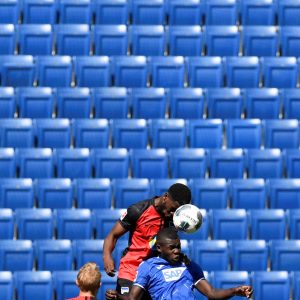In defence of Luis Suarez’s handball
When the shady Uruguayan robbed Ghana exactly a decade ago, he showed a ruthlessness that too many African World Cup contenders have lacked.
Author:
29 June 2020

The worst part wasn’t the handball. The worst part came two minutes later.
A canny broadcast editor showed us a replay of Uruguay’s Luis Suarez as he headed for the tunnel, after being sent off for handling a goalbound shot at the death of the Uruguay-Ghana 2010 Fifa World Cup quarterfinal tie. Just before he left the field, he paused and looked back towards the scene of his crime, on tenterhooks, to see Asamoah Gyan’s penalty kick slam into the crossbar and upward.
Suarez erupted in instant glee, as though he had just won the World Cup. His front teeth gleamed in the frosty Joburg night, and then he was gone.
For Ghanaians, and for South African fans who had adopted the Black Stars as our surrogate national side, this was too much to bear. The gall of the man. How could he cheat so brazenly and then revel so shamelessly in the success of his crime?
For Uruguay, of course, Suarez had no cause for shame. Quite the opposite. He had done what he had to do for his team and his nation. He had taken the fall and was overjoyed, despite knowing he had removed himself from a potential World Cup semifinal. This was Suarez sacrificing himself for the collective. It was gritty garra charrua in action – the beating, sometimes cheating heart of Uruguayan football.
Related article:
Cut to 10 years later and Suarez has matured into a striker with few equals. We knew he was very good in 2010, but not quite how insanely good. To be sure, Suarez has added plenty more sins to his rap sheet in the intervening decade – a catalogue of crafty dives, a couple of nasty bites and a racist insult directed at Patrice Evra. But the sheer technical sublimity of his finishing, his relentless drive and his game-reading ability have complicated the villainous figure of the Soccer City quarterfinal.
The Suarez Factor
Even his exploits that night are worth revisiting and reinterpreting. Because there is a strong possibility that the failures of African sides on the World Cup stage can be linked partly to a continental shortage of the thing that we might call the Suarez Factor.
In a narrow sense, it’s the willingness to do the wrong thing at the right time. But more broadly, players with the Suarez Factor are able to remove moral, emotional or aesthetic considerations from their decision-making equations in the heat of combat. So when a game situation makes a dive worthwhile, they will dive with no qualms. When an opponent is prickly or dangerous or both, they will foul him to rattle him, perhaps even to hurt him.
In the purest form of this approach, such players will slap a goalbound opposition shot in the general direction of Maponya Mall. If you get sent off and lose the game by the resulting penalty goal, so be it – the point is you might not.
Related article:
Lots of Uruguayan players are good at making these Suarezian calculations, and that’s partly the legacy of being a small country whose club and national teams are technically and creatively outgunned by their Brazilian or Argentinian rivals. When you’re representing Uruguay against Brazil, or Penarol against Flamengo, you are forced to play to your non-technical strengths.
That means working a bit harder, being a bit dirtier and being a lot more irritating, with little care for moral victories or style points. Iceland’s recent prowess at big tournaments was animated by a similarly feisty underdog culture. Ditto Cameroon’s success from the 1980s until the millennium. Indomitable Lions represented a smaller talent pool than the other West African giants, and took a much more physically robust approach to the game.
When Cameroon beat Argentina in the opening game of Italia 90, they did so in large part by kicking the cocaine out of Diego Maradona. And the heroics of Roger Milla as the tournament progressed were underpinned by the ferocious defensive efforts of utilitarian players like Cyrille Makanaky, Jean-Claude Pagal and Andre Kana-Biyik.
Related article:
But developing these compensatory edges – physicality, cynicism, the ability to box clever without the ball – requires sustained exposure to stronger sides. That may partly explain why countries such as Nigeria or Ivory Coast or Ghana tend not to realise their potential on the World Cup stage. Their regular fixtures are played largely against weaker sides that fight hard but cannot match them.
Even Bafana Bafana have a milder version of this problem, despite our limited firepower. You don’t learn how to punch upwards when you’re usually punching sideways against other middleweight African sides, or downwards against Council of Southern Africa Football Associations neighbours.
How small nations learn to pack a punch
The smaller countries that overperform in big tournaments are those that nestle in the shadows of giants. They are constantly playing neighbouring superpowers and constantly exporting their best players to superpower leagues. Think Uruguay, Croatia, Belgium, Holland, Portugal, Iceland.
As a side note, you could make the case that this “pocket rocket” syndrome is echoed in the global hierarchies of economic and social progress. As a rule of thumb, we are better off living in small, nimble, non-aligned countries that make clever decisions about how they organise their societies. You have a better chance of being a fulfilled, happy person if you’re born in Botswana rather than South Africa, or if you’re Danish and not British, Uruguayan and not Brazilian, a New Zealander and not Australian.
Related article:
Slow down, you might well say. Let’s not invest too much geopolitical significance into one professional foul. Suarez’s Hand of the Devil moment was not a manifesto of non-aligned, social-democratic politics. But it was a manifesto on the necessity of football sin.
Eventually, an African side will destroy that stubborn World Cup quarterfinal barrier. In the meantime, we can blame that bastard with evil hands.
But the next time an African side finds itself level in injury time at the sweaty end of a quarterfinal, it might even be worth asking two awkward questions: What would Suarez do? And shouldn’t we do it too?




